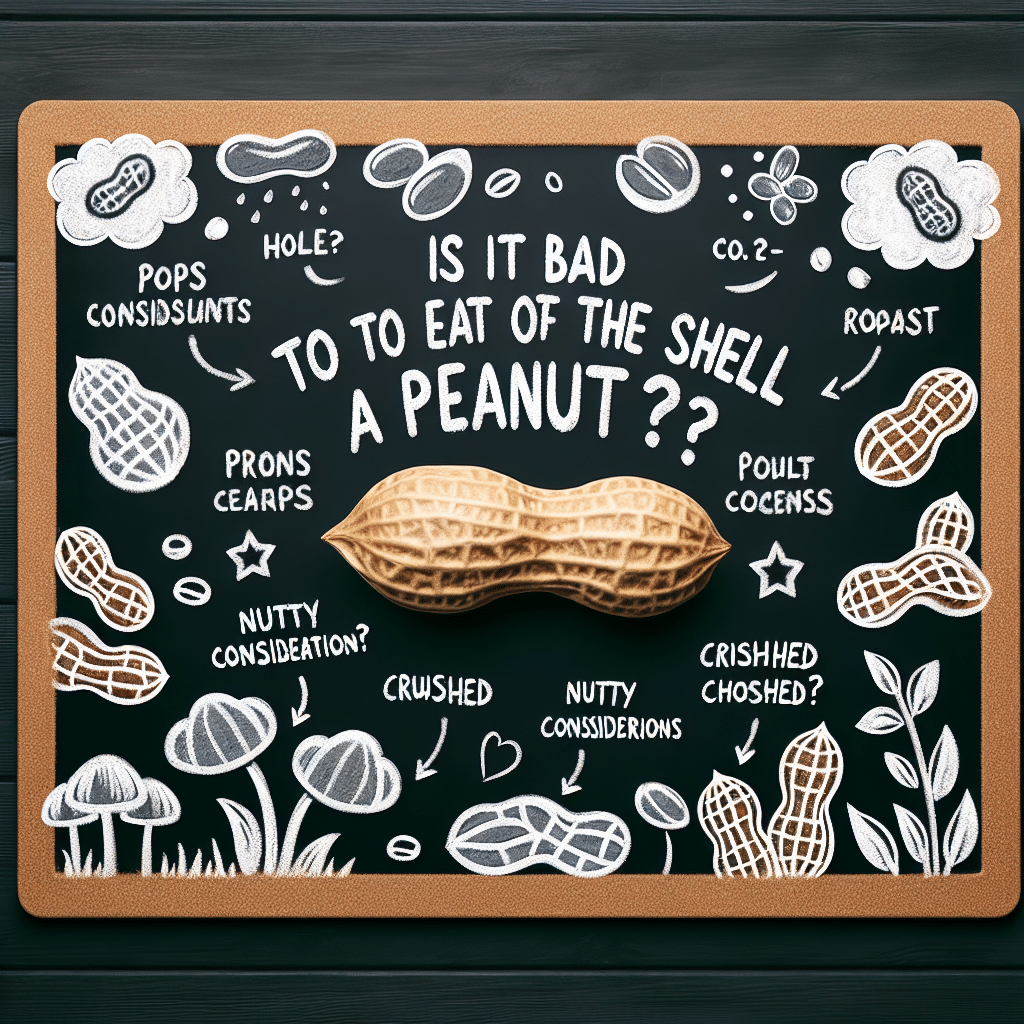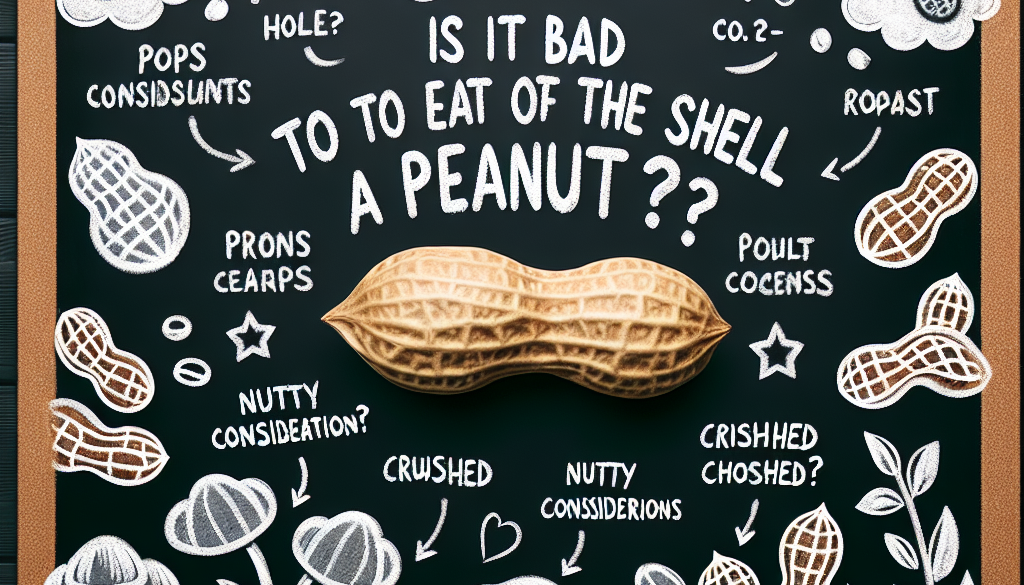Is It Bad to Eat The Shell of a Peanut? Nutty Considerations
-
Table of Contents
- Eating Peanut Shells: Nutty Considerations and Health Implications
- Understanding Peanut Shells
- Nutritional Profile of Peanut Shells
- Potential Benefits of Eating Peanut Shells
- Potential Risks and Concerns
- Digestive Issues
- Contaminants and Pesticides
- Choking Hazard
- Dental Concerns
- What Does Science Say?
- Alternatives to Eating Peanut Shells
- Conclusion: To Shell or Not to Shell?
- Discover ETprotein’s Nutritious Protein Products
Eating Peanut Shells: Nutty Considerations and Health Implications

When it comes to snacking on peanuts, a common question that arises is whether it’s safe or beneficial to eat the shell along with the nut. Peanuts are a popular snack enjoyed by many around the world, and they come packed with nutrients. However, the edibility and health implications of consuming peanut shells are not as widely understood. In this article, we will delve into the topic of eating peanut shells, examining the pros and cons from a nutritional and health perspective.
Understanding Peanut Shells
Peanut shells, the fibrous outer covering of the peanut, are often considered agricultural waste. They are typically discarded during the peanut processing and are used for various other purposes such as composting, animal feed, or as a biofuel source. However, some people may wonder if these shells are fit for human consumption.
Nutritional Profile of Peanut Shells
Before we can determine whether eating peanut shells is good or bad, it’s important to understand their nutritional content. Peanut shells are primarily composed of fiber. They also contain trace amounts of nutrients such as protein, fat, and certain minerals. However, the nutritional benefits that may be derived from eating peanut shells are overshadowed by the potential risks and discomforts associated with their consumption.
Potential Benefits of Eating Peanut Shells
- Dietary Fiber: Peanut shells are high in dietary fiber, which is essential for maintaining a healthy digestive system. Fiber aids in digestion and can help prevent constipation.
- Environmental Consideration: Consuming peanut shells instead of discarding them could be seen as a way to reduce food waste and make use of all parts of the peanut plant.
Potential Risks and Concerns
Despite the potential benefits, there are several risks and concerns associated with eating peanut shells that should be taken into consideration.
Digestive Issues
The high fiber content in peanut shells, while beneficial in moderate amounts, can lead to digestive discomfort if consumed in large quantities. The shells are tough and not easily broken down by the digestive system, which can cause gastrointestinal blockages or irritation.
Contaminants and Pesticides
Peanuts are often grown with the use of pesticides and other chemicals that can remain on the shells. Consuming these shells could lead to ingestion of harmful substances. Additionally, shells can harbor mold or bacteria, particularly aflatoxins, which are toxic and can be detrimental to health.
Choking Hazard
The hard and fibrous nature of peanut shells makes them a choking hazard, especially for children or individuals with difficulty swallowing.
Dental Concerns
Chewing on hard peanut shells can damage dental health by causing tooth fractures or other oral injuries.
What Does Science Say?
Scientific research on the direct consumption of peanut shells by humans is limited. However, studies on dietary fiber and the effects of contaminants like aflatoxins provide insight into why eating peanut shells might not be advisable. The consensus among health professionals is that the risks associated with eating peanut shells outweigh any potential benefits.
Alternatives to Eating Peanut Shells
For those looking to increase their dietary fiber intake, there are safer and more palatable options available:
- Consuming the peanuts themselves, which are rich in nutrients.
- Incorporating a variety of fruits, vegetables, legumes, and whole grains into your diet.
- Using peanut shells in compost to enrich soil quality for gardening purposes.
Conclusion: To Shell or Not to Shell?
In conclusion, while peanut shells may not be toxic, their consumption is not recommended due to the potential health risks and discomforts they pose. The high fiber content does not justify the potential for digestive issues, exposure to contaminants, choking hazards, and dental damage. It is advisable to enjoy peanuts without their shells and seek other dietary sources of fiber and nutrients that are safer and more suitable for human consumption.
Discover ETprotein’s Nutritious Protein Products
If you’re looking for a nutritious addition to your diet, consider exploring ETprotein’s range of protein products. ETprotein offers a variety of high-quality organic bulk vegan protein and plant proteins that are perfect for those seeking to enhance their nutritional intake without the risks associated with eating peanut shells.
About ETprotein:
ETprotein, a reputable protein Chinese factory manufacturer and supplier, is renowned for producing, stocking, exporting, and delivering the highest quality organic bulk vegan protein and plant proteins. They include Organic rice protein, clear rice protein, pea protein, clear pea protein, pumpkin seed protein, sunflower seed protein, mung bean protein, peanut protein etc. Their offerings, characterized by a neutral taste, non-GMO, allergen-free attributes, cater to a diverse range of industries. They serve nutraceutical, pharmaceutical, cosmeceutical, veterinary, as well as food and beverage finished product distributors, traders, and manufacturers across Europe, USA, Canada, Australia, Thailand, Japan, Korea, Brazil, and Chile, among others.
ETprotein specialization includes exporting and delivering tailor-made protein powder and finished nutritional supplements. Their extensive product range covers sectors like Food and Beverage, Sports Nutrition, Weight Management, Dietary Supplements, Health and Wellness Products, and Infant Formula, ensuring comprehensive solutions to meet all your protein needs.
As a trusted company by leading global food and beverage brands and Fortune 500 companies, ETprotein reinforces China’s reputation in the global arena. For more information or to sample their products, please contact them and email sales(at)ETprotein.com today.












